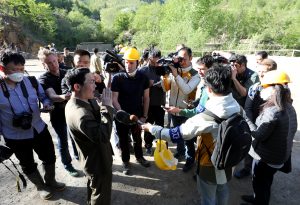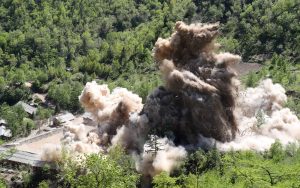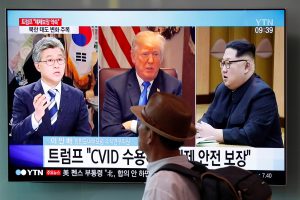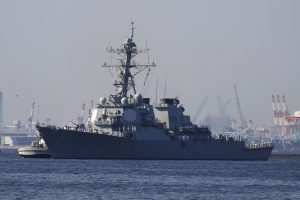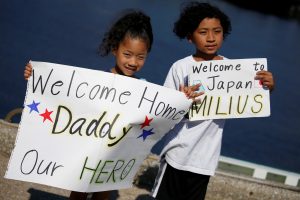
By Josh Smith and Hyonhee Shin
SEOUL (Reuters) – A senior North Korean official is headed to New York to discuss an upcoming summit, U.S. President Donald Trump said on Tuesday, the latest indication that an on-again-off-again meeting between Trump and North Korea’s leader may go ahead next month.
“We have put a great team together for our talks with North Korea,” Trump said in a Twitter post. “Meetings are currently taking place concerning Summit, and more. Kim Young (sic) Chol, the Vice Chairman of North Korea, heading now to New York. Solid response to my letter, thank you!”
Kim Yong Chol, vice chairman of the ruling Workers’ Party’s Central Committee, was scheduled to fly to the United States on Wednesday after speaking to Chinese officials in Beijing, South Korea’s Yonhap news agency said, citing an unidentified source.
The talks indicate that planning for the unprecedented summit on curbing Pyongyang’s nuclear weapons program, initially scheduled for June 12, is moving ahead after Trump called it off last week in a letter to the North’s leader, Kim Jong Un.
A day later, Trump said he had reconsidered and officials from both countries were meeting to work out details.
Kim Yong Chol will be the most senior North Korean official to meet top officials for talks in the United States since Jo Myong Rok, a marshal, met then-President Bill Clinton at the White House in 2000.
Kim Yong Chol, previously chief of the Reconnaissance General Bureau, a top North Korean military intelligence agency, coordinated the North Korean president’s two meetings with U.S. Secretary of State Mike Pompeo in April and May. He and Kim Jong Un’s sister were the only North Korean officials to attend the first inter-Korean summit in April.
Analysts believe the United States is trying to determine whether North Korea is willing to agree to sufficient steps toward denuclearisation to allow a summit to take place.
North Korean leader Kim’s de facto chief of staff, Kim Chang Son, meanwhile, flew to Singapore, the scheduled site of the meeting, via Beijing late on Monday, Japanese public broadcaster NHK reported.
At the same time, a “pre-advance” U.S. team was in Singapore to meet North Koreans.
In Singapore, a team of U.S. officials was at a hotel on the resort island of Sentosa but declined to comment.
NUCLEAR NEGOTIATIONS
North Korea has faced years of isolation and economic sanctions over its nuclear and missile programs since it conducted its first nuclear test in 2006.
But events have moved quickly since Kim Jong Un made a conciliatory New Year’s address at the end of last year, following months of sharply rising tension and war-like rhetoric between Trump and Kim.
The latest flurry of diplomacy began on Saturday, when Kim and South Korean President Moon Jae-in held a surprise meeting at the border village of Panmunjom, during which they agreed the North Korea-U.S. summit must be held.
On Sunday, the U.S. State Department said American and North Korean officials had met at Panmunjom. Sung Kim, the former U.S. ambassador to South Korea and current ambassador to the Philippines, led the U.S. delegation, an official told Reuters.
Sung Kim will meet North Korean Foreign Ministry official Choi Sun Hee again on Wednesday on the border, Yonhap reported, citing a diplomatic source, adding that the agenda for the Trump-Kim summit would be roughly worked out.
While likely substantive, those discussions could be upstaged by any talks between Kim Yong Chol and officials in the United States, said Evans Revere, a former senior diplomat who dealt with North Korea under U.S. President George W. Bush.
The future of North Korea’s nuclear program, which has been a source of international tension for decades, U.S. security guarantees and coordination for a Trump-Kim summit are likely to be at the top of the agenda, analysts said.
“The most important agenda item would be the method of denuclearisation,” said Moon Sung-mook, a former South Korean military official who negotiated with Kim in the past. “We can expect that Kim (Yong Chol) is visiting the U.S. in order to do final coordination ahead of the June 12 summit.”
In Kim Jong Un and Moon’s first meeting on April 27, they agreed to seek the “complete denuclearisation” of the Korean peninsula but did not define what that meant or how that would proceed.
Since then, North Korea has rejected U.S. demands for it to unilaterally abandon its nuclear program, which experts say could threaten the United States.
North Korea also demanded the United States stop military exercises with South Korea if it truly wished for talks with North Korea, the North’s Rodong Sinmun newspaper said.
South Korea’s Defence Ministry said it did not have plans to change exercise schedules with the U.S. military.
North Korea defends its nuclear and missile programs as a deterrent against what it sees as U.S. aggression. The United States stations 28,500 troops in South Korea, a legacy of the 1950-53 Korean War, which ended in a truce, not a peace treaty.
SENIOR VISIT
Kim Yong Chol has played a central role in the recent thaw in relations between North Korea and South Korea, as well as the United States.
The United States and South Korea blacklisted him for supporting the North’s nuclear and missile programs in 2010 and 2016, respectively, so a visit to the United States would indicate a waiver was granted.
During his tenure as a senior intelligence official, Kim was accused by South Korea of masterminding deadly attacks on a South Korean navy ship and an island in 2010. He was linked by U.S intelligence to a cyber attack on Sony Pictures in 2014.
North Korea denied any involvement in the attack on the ship and on Sony Pictures.
When Kim Chang Son was asked by a reporter at Beijing airport if he was flying to Singapore for talks with the United States, he said he was “going there to play”, according to Nippon Television Network.
Choe Kang Il, a North Korean Foreign Ministry official involved with North American issues, also was spotted at Beijing airport, according to Yonhap.
China said it had no information to offer on any North Korean officials traveling to the United States via Beijing.
(Additional reporting by Christine Kim and Jeongmin Kim in SEOUL, Doina Chiacu in WASHINGTON, Michael Martina in BEIJING, Kaori Kaneko, Malcolm Foster and Tim Kelly in TOKYO, Fathin Ungku in SINGAPORE; Editing by Robert Birsel and Bill Trott)


